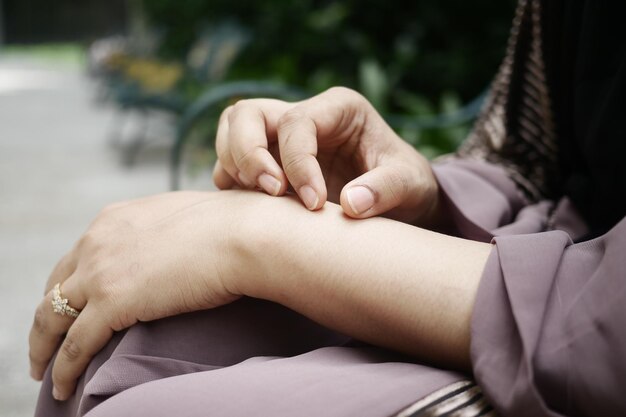Finding Relief: Your Guide to Managing Eczema on Hands
Living with eczema on your hands can feel like an uphill battle, affecting not just your skin, but your everyday life. Those who suffer are familiar with the relentless cycle of itching, irritation, and discomfort that can hinder daily activities. While a complete "cure" for eczema remains elusive, there are effective strategies for managing and significantly reducing its impact. In this guide, we’ll explore practical steps you can take to find relief and regain control.
Understanding Eczema: What Causes the Flare-Ups?
Before diving into solutions, it’s essential to understand what eczema is and why it happens. Eczema, also known as atopic dermatitis, is a chronic skin condition characterized by dry, itchy, and inflamed skin. It’s most common on the hands, where exposure to irritants is frequent.
Common Triggers and Risk Factors
Eczema isn’t caused by a single factor; rather, it’s a combination of genetics, environmental triggers, and immune system activity. Some common factors include:
- Genetic predisposition: If others in your family have eczema, you may be more likely to experience it.
- Allergens: Including pollen, pet dander, and certain foods.
- Irritants: Such as soaps, detergents, and fragrances that come into contact with the skin.
- Stress: Emotional stress can exacerbate symptoms.
- Climate: Extreme temperatures and humidity levels can trigger flare-ups.
Understanding what triggers your eczema is a step toward better management.
Building a Skincare Routine that Works
A consistent skincare routine is the cornerstone of managing eczema on hands. Here’s how you can create one that suits your needs.
Keep It Simple and Gentle
Your skincare products should be free from harsh chemicals and fragrances. Look for gentle, dermatologist-approved products that are formulated for sensitive skin. Consider the following routine:
Moisturize Regularly: Frequent moisturizing is crucial. Use a thick, fragrance-free cream or ointment several times a day, especially after washing your hands.
Mild Cleansers: Choose a mild, soap-free cleanser for washing your hands. Avoid hot water, as it can strip your skin of moisture. Lukewarm water is best.
Protective Gloves: Wear gloves when using cleaning products or when exposed to anything that might irritate your skin.
Protective Measures Against Irritants
Beyond skincare products, it’s essential to shield your hands from further irritation:
- Cotton Gloves for Everyday Use: These can provide an additional layer of protection during activities that might expose your skin to allergens.
- Avoid Occlusive Materials: Materials like latex can sometimes worsen symptoms, so choose gloves made from eczema-friendly materials.
- Stay Hydrated: Drinking plenty of water can keep your skin hydrated from the inside.
Exploring Natural Remedies
While eczema management often involves topical treatments and lifestyle changes, some find relief in natural remedies. Here are a few that might soothe your symptoms:
Oatmeal Baths and Aloe Vera
Oatmeal Baths: Oatmeal is known for its anti-inflammatory properties. Soaking your hands in an oatmeal bath can help soothe irritated skin.
Aloe Vera: With its cooling and anti-inflammatory effects, aloe vera gel can be applied to the affected areas for relief.
Coconut Oil and Honey
Coconut Oil: Rich in lauric acid, coconut oil has properties that can aid moisture retention and reduce inflammation.
Honey: Known for its antibacterial and healing properties, applying honey can help manage eczema discomfort.
Lifestyle Adjustments to Mitigate and Manage
Adjustments in your daily routine can significantly impact eczema’s severity and frequency. Here are vital lifestyle considerations:
Diet and Nutrition
What you consume can affect your skin’s condition. Consider these dietary adjustments:
Anti-Inflammatory Foods: Incorporate foods rich in omega-3 fatty acids, like salmon and flaxseed, to combat inflammation.
Allergen Awareness: Identify and avoid foods that might trigger your symptoms, such as dairy or gluten.
Stress Management
Stress is a known eczema trigger. Implement stress-reduction techniques into your routine:
Mindfulness and Meditation: Practicing mindfulness can decrease stress levels, potentially reducing eczema flare-ups.
Regular Exercise: Engaging in regular physical activity can lower stress hormones and improve overall skin health.
Seeking Professional Advice
If home management strategies aren’t providing relief, seeking professional help can make a significant difference.
Understanding Treatment Options
Discussing your symptoms with a healthcare provider could lead to treatments that are tailored to your specific condition. Options might include:
- Topical Steroids: Prescribed to reduce inflammation and itching.
- Antihistamines: To reduce itching.
- Light Therapy: In some cases, controlled exposure to ultraviolet light can help.
Importance of Professional Guidance
Remember, while this guide provides general suggestions, a healthcare professional can diagnose eczema and create a targeted treatment plan. Open communication with your doctor is paramount to managing this condition effectively.
Embracing a Supportive Community
Finally, finding support can be crucial in dealing with eczema. Connecting with others who understand the challenges of living with eczema can provide emotional comfort and practical advice.
Online Communities and Support Groups
Digital Forums: Many online platforms offer spaces for those with eczema to share experiences, tips, and support.
Local Support Groups: In-person meetings can offer a sense of community and direct support.
Ultimately, while eczema on the hands can be challenging, with a thoughtful approach to skincare, lifestyle adjustments, and guidance from healthcare professionals, it is manageable. Understanding your unique triggers and actively taking steps to care for your skin can significantly improve your quality of life.
Quick Tips for Managing Eczema on Hands 🌟
- 💧 Moisturize Frequently: Keep hands hydrated with fragrance-free lotions.
- 🧤 Wear Protective Gloves: Shield hands from irritants, especially during chores.
- 🍏 Eat Anti-Inflammatory Foods: Boost your diet with omega-3-rich foods.
- 🛁 Opt for Soothing Baths: Try oatmeal baths to alleviate symptoms.
- 🧘 Practice Stress Management: Utilize meditation and exercise to minimize stress-induced flare-ups.
- 📞 Consult Healthcare Professionals: Ask about tailored treatment plans for severe cases.
- 🤝 Connect with Support Groups: Find emotional and practical support within the community.
By taking a proactive approach, you can embark on the path to more manageable and comfortable skin.

